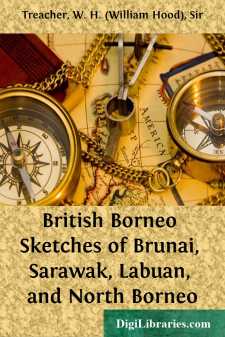Categories
- Antiques & Collectibles 13
- Architecture 36
- Art 48
- Bibles 22
- Biography & Autobiography 813
- Body, Mind & Spirit 142
- Business & Economics 28
- Children's Books 15
- Children's Fiction 12
- Computers 4
- Cooking 94
- Crafts & Hobbies 4
- Drama 346
- Education 46
- Family & Relationships 57
- Fiction 11828
- Games 19
- Gardening 17
- Health & Fitness 34
- History 1377
- House & Home 1
- Humor 147
- Juvenile Fiction 1873
- Juvenile Nonfiction 202
- Language Arts & Disciplines 88
- Law 16
- Literary Collections 686
- Literary Criticism 179
- Mathematics 13
- Medical 41
- Music 40
- Nature 179
- Non-Classifiable 1768
- Performing Arts 7
- Periodicals 1453
- Philosophy 64
- Photography 2
- Poetry 896
- Political Science 203
- Psychology 42
- Reference 154
- Religion 513
- Science 126
- Self-Help 84
- Social Science 81
- Sports & Recreation 34
- Study Aids 3
- Technology & Engineering 59
- Transportation 23
- Travel 463
- True Crime 29
British Borneo Sketches of Brunai, Sarawak, Labuan, and North Borneo
Categories:
Description:
Excerpt
Chapter I.
In 1670 Charles II granted to the Hudson's Bay Company a Charter of Incorporation, His Majesty delegating to the Company actual sovereignty over a very large portion of British North America, and assigning to them the exclusive monopoly of trade and mining in the territory. Writing in 1869, Mr. William Forsyth, , says:—"I have endeavoured to give an account of the constitution and history of the last of the great proprietary companies of England, to whom a kind of delegated authority was granted by the Crown. It was by some of these that distant Colonies were founded, and one, the most powerful of them all, established our Empire in the East and held the sceptre of the Great Mogul. But they have passed away
——fuit Ilium et ingensGloria Teucrorum—
and the Hudson's Bay Company will be no exception to the rule. It may continue to exist as a Trading Company, but as a Territorial Power it must make up its mind to fold its (buffalo) robes round it and die with dignity." Prophesying is hazardous work. In November, 1881, two hundred and eleven years after the Hudson's Bay Charter, and twelve years after the date of Mr. Forsyth's article, Queen Victoria granted a Charter of Incorporation to the British North Borneo Company, which, by confirming the grants and concessions acquired from the Sultans of Brunai and Sulu, constitutes the Company the sovereign ruler over a territory of 31,000 square miles, and, as the permission to trade, included in the Charter, has not been taken advantage of, the British North Borneo Company now does actually exist "as a Territorial Power" and not "as a Trading Company."
Not only this, but the example has been followed by Prince Bismarck, and German Companies, on similar lines, have been incorporated by their Government on both coasts of Africa and in the Pacific; and another British Company, to operate on the Niger River Districts, came into existence by Royal Charter in July, 1886.
It used to be by no means an unusual thing to find an educated person ignorant not only of Borneo's position on the map, but almost of the very existence of the island which, regarding Australia as a continent, and yielding to the claims recently set up by New Guinea, is the second largest island in the world, within whose limits could be comfortably packed England, Scotland, Wales and Ireland, with a sea of dense jungle around them, as Wallace has pointed out. Every school-board child now, however, knows better than this.
Though Friar Odoric is said to have visited it about 1322, and Ludovico Berthema, of Bologna, between 1503 and 1507, the existence of this great island, variously estimated to be from 263,000 to 300,000 square miles in extent, did not become generally known to Europeans until, in 1518, the Portuguese Lorenzo de Gomez touched at the city of Brunai. He was followed in 1521 by the Spanish expedition, which under the leadership of the celebrated Portuguese circumnavigator Magellan, had discovered the Philippines, where, on the island of Mactan, their leader was killed in April, 1520. An account of the voyage was written by Pigafetta, an Italian volunteer in the expedition, who accompanied the fleet to Brunai after Magellan's death, and published a glowing account of its wealth and the brilliancy of its Court, with its royally caparisoned elephants, a report which it is very difficult to reconcile with the present squalid condition of the existing "Venice of Hovels," as it has been styled from its palaces and houses being all built in, or rather over, the river to which it owes its name.
The Spaniards found at Brunai Chinese manufactures and Chinese trading junks, and were so impressed with the importance of the place that they gave the name of Borneo—a corruption of the native name Brunai—to the whole island, though the inhabitants themselves know no such general title for their country.
In some works, Pulau Kalamantan, which would signify wild mangoes island, is given as the native name for Borneo, but it is quite unknown, at any rate throughout North Borneo, and the island is by no means distinguished by any profusion of wild mangoes.
In 1573, a Spanish Embassy to Brunai met with no very favourable reception, and three years later an expedition from Manila attacked the place and, deposing a usurping Sultan, re-instated his brother on the throne, who, to shew his gratitude, declared his kingdom tributary to Spain....


